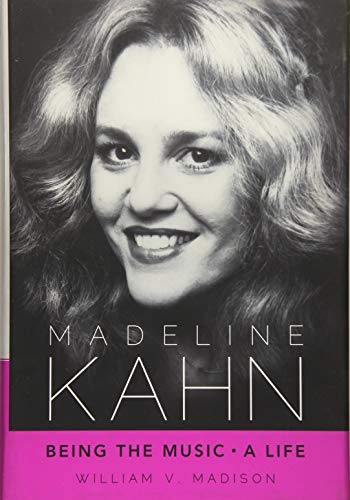
As we all know, Madeline Kahn was a genius, a trailblazer, and a comedy icon. We fell in love with her ever since we saw her on the stage, and especially on the silver screen in such comedy classics as What’s Up Doc? (1972) and Young Frankenstein (1974). The Academy certainly adored her when they nominated her for Best Supporting Actress for both Paper Moon (1973) and Blazing Saddles (1974). In these films and others, she proved that women can be funny and hilarious, as well as dedicated and intelligent to their craft. But, there was so much more to her than just being a very funny and rather earthy comedienne. She was a fiercely independent, and very private person, symbolized perfectly in author William V. Madison’s exquisitely intimate biography, Madeline Kahn – Being the Music, A Life.
Madison’s respectable and carefully pitched biography details her growing up without a father, and dealing with a very erratically domineering mother, to eventually achieving success as a Broadway and film star. Reading this biography, I was amazed to discover how smart and disciplined she really was, earning a degree in speech therapy from Hofstra University and trying to become a teacher. When I watch her films now, I realize that behind the beauty, the bawdy characterizations of her most famous roles, and her naturalistic delivery, there was a more fragile and broken spirit underneath the talent. There was a complexity to her that not everyone knew about, especially after her disastrous experience in 1978 during On the Twentieth Century on Broadway. This is where she thought her career was over, but after a few years later, she experienced a huge comeback until her untimely death in 1999 from ovarian cancer.
The more I delved deeper into her life story, the more I could relate to her. She was insecure about her looks, and thought that she was the cause of her parents’ divorce, after her father walked out of her life. Her mother remarried and then got divorced again, as well as her father remarrying, divorcing, and remarrying again. This gave her doubts about marriage. She had a habit of falling in love with her leading men, and she had several boyfriends, but she never moved in nor married them. She did however marry her long-time boyfriend John Hansbury weeks before her death.
She was born Madeline Gail Wolfson on September 29, 1942 in Chelsea, Massachusetts, where Freda taught her to sing and play piano, even up until the late ’70s, when her mother continued to push Madeline beyond her limits. Eventually, her mother Freda Goldberg would end up in a nursing home with very bad memory. Bernie, her father, was the only man in her life to ever abandon her. This was pretty painful to read because I was able to connect moments of Madeline’s life to mine. This made me drawn to her even more.
I think my favorite chapter in the biography described how director Peter Bogdanovich fought for her to play Trixie Delight in his 1973 classic Paper Moon. She admitted that people thought she was wrong for the part after they saw her in What’s Up Doc? a year before. Obviously, she proved all the doubters wrong, especially when she earned a Best Supporting Actress nomination for her portrayal. It is here where she polished her dramatic chops to deliver one of her most subtle, sensual, and nuanced performances.
I would go on but I think for Madeline’s sake and privacy, I will stop here. However, I will say that this is arguably the most hauntingly intimate bio of a legendary star I have ever read. The details, albeit harrowing, are handled with soul and remarkability. I’m pretty sure that there have been other biographies on Ms. Kahn’s life, but I don’t think that they do explore the real side of her that Madison’s bio does. If you should read one book, memoir, or biography, this is definitely the one to beat. I think Madeline would agree as well.